Welcome to the 105th issue of CEE News!
.
 At the beginning of each summer, I like to share curated lists of new books that provide diverse perspectives to help our readers grow both personally and professionally. This year, I’m switching things up. With close to 4 million new books being published each year, I’m prioritizing quality over quantity, and sharing six engrossing books about the dynamics between power and leadership that I’ve read in the past year. I hope you’ll find this list helpful if you’re looking for something to read this summer that will bring you to think more deeply about the way power has shaped modern American history, and what can be learned to build a better future.
At the beginning of each summer, I like to share curated lists of new books that provide diverse perspectives to help our readers grow both personally and professionally. This year, I’m switching things up. With close to 4 million new books being published each year, I’m prioritizing quality over quantity, and sharing six engrossing books about the dynamics between power and leadership that I’ve read in the past year. I hope you’ll find this list helpful if you’re looking for something to read this summer that will bring you to think more deeply about the way power has shaped modern American history, and what can be learned to build a better future.
In 2022, I watched the documentary, Turn Every Page, by filmmaker Lizie Gottlieb about the 50-year relationship between author Robert Caro and his editor Robert Gottlieb, the filmmaker’s father. In the 1970s, Caro started writing The Power Broker (Book No. 1, below). In the documentary, the author/editor pair are knee deep in the fifth and final volume of The Years of Lyndon Johnson. Gottlieb died last June at the age of 92, leaving the then 88-year-old Caro to finish their monumental collaboration.
“What I’m trying to do,” said Caro, “is to show not only how power works but the effect of power on the powerless: How political power affects our lives, every single day, in ways we never think about.”
As a student of the impact of power on leadership and culture, I started reading Caro’s, The Power Broker and went on to devour the four completed volumes of his magnificent works on Lyndon Johnson. If you’re also a student of the dynamics between power, leadership, and culture, these six books below will easily last you all summer and will resonate with you for a lifetime.
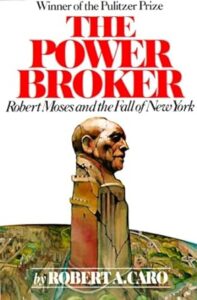 1. The Power Broker: Robert Moses and the Fall of New York, by Robert Caro (July 12, 1975)
1. The Power Broker: Robert Moses and the Fall of New York, by Robert Caro (July 12, 1975)
One of the Modern Library’s hundred greatest books of the 20th centory, Robert Caro’s monumental book makes public what few outsiders knew: that Robert Moses was the single most powerful man of his lifetime in the City and State of New York. In telling the Moses story, Caro both opens up to an unprecedented degree the way in which politics really happens – the way things really get done in America’s City Halls and Statehouses – and brings to light a bonanza of vital information about such national figures as Franklin D. Roosevelt, Fiorello La Guardia, and Nelson Rockefeller.
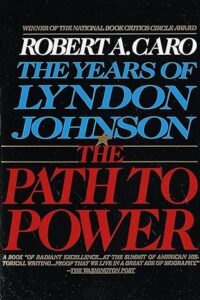 2. The Years of Lyndon Johnson: The Path to Power, by Robert Caro (February 17, 1990)
2. The Years of Lyndon Johnson: The Path to Power, by Robert Caro (February 17, 1990)
The Path to Power, Book One of The Years of Lyndon Johnson, reveals in extraordinary detail the genesis of the almost superhuman drive, energy, and urge to power that set LBJ apart. Chronicling the startling early emergence of Johnson’s political genius, it follows him from his Texas Hill Country boyhood through the years of the Depression, to the triumph of his congressional debut in New Deal Washington, to his heartbreaking defeat in his first race for the Senate, and his attainment, by any means necessary, of the national power for which he hungered.
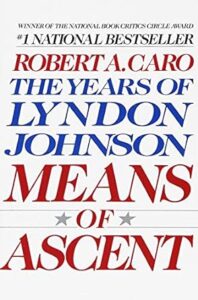 3. The Years of Lyndon Johnson: Means of Ascent, by Robert Caro (March 7, 1990)
3. The Years of Lyndon Johnson: Means of Ascent, by Robert Caro (March 7, 1990)
Here, Johnson’s almost mythic personality—part genius, part behemoth, at once hotly emotional and icily calculating—is seen at its most nakedly ambitious. This multifaceted book carries the President-to-be from the aftermath of his devastating defeat in his 1941 campaign for the Senate-the despair it engendered in him, and the grueling test of his spirit that followed as political doors slammed shut-through his service in World War II (and his artful embellishment of his record) to the foundation of his fortune (and the actual facts behind the myth he created about it).
 4. The Years of Lyndon Johnson: Master of the Senate, by Robert Caro (April 23, 2002)
4. The Years of Lyndon Johnson: Master of the Senate, by Robert Caro (April 23, 2002)
In this winner of the Pulitzer Prize and National Book Award, Caro takes Johnson’s story through one of its most remarkable periods: his twelve years, from 1949 through 1960, in the U.S. Senate. Once the most august and revered body in politics, by the time Johnson arrived, Caro shows how Johnson’s brilliance, charm, and ruthlessness enabled him to become the youngest and most powerful Majority Leader in history and how he used his incomparable legislative genius – cajoling and threatening both Northen liberals and Southern conservatives – to pass the first Civil Rights legislation since Reconstruction. Brilliantly weaving rich detail into a gripping narrative, Caro gives us both a galvanizing portrait of Johnson himself and a definitive and revelatory study of the workings of legislative power.
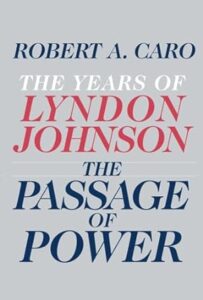 5. The Lyndon Johnson Years: The Passage of Power, by Robert Caro (May 1, 2012)
5. The Lyndon Johnson Years: The Passage of Power, by Robert Caro (May 1, 2012)
The Passage of Power follows Johnson through both the most frustrating and triumphant periods of his career—1958 to 1964. It is a time that would see him trade the extraordinary power he had created for himself as Senate Majority Leader for what became the wretched powerlessness of a Vice President in an administration that disdained and distrusted him. Yet it was, as well, the time in which the presidency, the goal he had always pursued, would be thrust upon him in the moment it took an assassin’s bullet to reach its mark.
If you’ve already read, or don’t have the appetite for the 4,888 pages by Robert Caro, I highly recommend this Pulitzer Prize winner and my favorite book of 2024 so far . . .
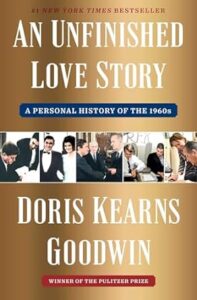 6. An Unfinished Love Story: A Personal History of the 1960s, by Doris Kearns Goodwin (April 16, 2024)
6. An Unfinished Love Story: A Personal History of the 1960s, by Doris Kearns Goodwin (April 16, 2024)
Doris Kearns Goodwin, one of America’s most beloved historians, artfully weaves together biography, memoir, and history. During the last years of her husband, Richard (Dick) Goodwin’s, life, the couple unpacked over three hundred boxes that Dick had squirreled away during his 50-year career. His unique speech-writing voice propelled him to the front row of 1960s America, Forest Gumpian-style, penning some of the most memorable political speeches, including John F. Kennedy’s Latin American speeches, Lyndon Johnson’s most famous civil rights and Great Society speeches, Robert Kennedy’s famous “ripple of hope” speech in South Africa in 1966, and, later, Al Gore’s presidential concession speech in 2000. An Unfinished Love Story takes you along on the emotional journey that gave the couple the opportunity to make fresh assessments of the central figures of our time and revive the hope that the youth of today will carry forward this unfinished love story with America.
Sheri Nasim | President & CEO


